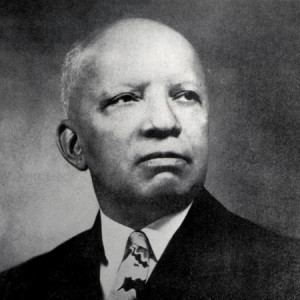Last weekend I had the pleasure of attending the Association for the Study of African American Life and History’s annual conference. This year’s ASALH conference, held in Atlanta, was a historic event: it marked one hundred years since the organization was founded by historian Carter G. Woodson. As always, ASALH was a mixture of academics and lay persons fascinated by African American history, all united in continuing the traditions of a now century-old organization.
In a year animated by discussions of usable pasts and African American history, #ASALH100 (the hashtag for the conference on Twitter) had from its start a theme of understanding how the past influences the present. There were many, many panels at this conference. I was not able to get to all of them, but I will instead offer some brief thoughts on several broad themes I noticed while attending the conference. As an example, there were several panels on African American intellectual history, including a State of the Field on African American intellectual history (which was chaired by Christopher Cameron, and included Derrick Aldridge, Mia Bay, Brandon Byrd, and Jessica Marie Johnson). This illustrates, I believe, a growing interest in African American intellectual history as debates about who is—and is not—a public intellectual inform more of our public discourse. Debates over who is a public intellectual are, more often than not, debates over who  deserves to be heard in the public sphere. In an age of Black Lives Matter, public discourse takes on a sense of added urgency. The panel I served on, titled “Historical Memory and Civil Rights Activism in the African American Twentieth Century,” also chaired by Dr. Cameron and including David Weinfeld and Afrah Richmond, also addressed the question of who gets to determine what voices are heard in public debates about race and history.
deserves to be heard in the public sphere. In an age of Black Lives Matter, public discourse takes on a sense of added urgency. The panel I served on, titled “Historical Memory and Civil Rights Activism in the African American Twentieth Century,” also chaired by Dr. Cameron and including David Weinfeld and Afrah Richmond, also addressed the question of who gets to determine what voices are heard in public debates about race and history.
There were also several panels about the “Carceral state” reflecting a greater scholarly interest among historians in the recent history of mass incarceration. I was also pleased to see several panels devoted to the legacy of W.E.B. Du Bois—I am always surprised by how much more can be written about Dr. Du Bois, until I remember just how extensive his corpus of writing and scholarship was. For instance, the “Exploring the Political and Intellectual Imagination of W.E.B. Du Bois” panel discussion (chaired by Stephanie Shaw, the author of W.E.B Du Bois and the Souls of Black Folk) included papers that focused on Du Bois’ writings on the American occupation of Haiti from 1915-1934, his views on the Great War, and Du Bois’ turn towards self-segregation in the 1930s. In addition, numerous panels emphasized continued scholarship on Black Power, athletics and African American history, and the internationalization of the field. Like other subfields of American history, African American history has a long tradition of transnational narratives. One of the more unique panels (which I am sorry to say I missed—again, so many wonderful panels at the conference) was one titled “We Who Are Japanese African Americanists: Intellectual Autobiographies of Japan Black Studies Association Members.” It is one thing for a field to embrace transnational narratives, which African American history (due to the history of slavery and civil rights activism) has had to do from its beginnings. We face another set of questions when considering how to teach African American history abroad—questions, I hasten to add, that would be asked when teaching American history abroad as well.
In short, it’s safe to say that African American intellectual history is experiencing a renaissance—seen also at this year’s Society of U.S. Intellectual Historians conference, which will have several panels sponsored by our good friends at the African American Intellectual History Society. And AAIHS will host their own conference in the spring of 2016. The very fact that ASALH has made it to a century of conferencing and scholarship is another testament to the resilience of African American history and the historians who examine that field. Also, the unique aspects of ASALH—embracing, instead of dividing itself from, the broader community, as well as acting as a reunion of sorts for so many historians united by a shared concern for both the African American past and its present—were a refreshing environment in an age of debates over the Confederate flag and mourning the loss of innocents in Charleston.
Next year’s conference in is Richmond, Virginia. If you want to see the vibrant state of African American history up close, I cannot think of a better place to do that than ASALH.

0